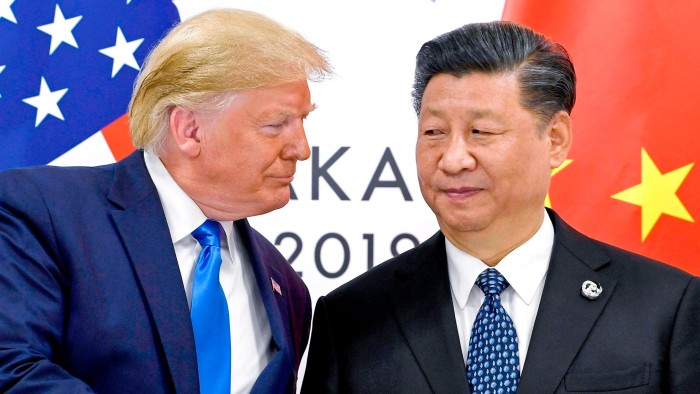Share this @internewscast.com
Unlock the White House Watch newsletter for free
China has told the US to “completely cancel all unilateral tariff measures” if Washington wants trade talks, in some of Beijing’s strongest comments on the deepening trade war between the world’s two economic superpowers.
Beijing also said there were “no economic and trade negotiations between China and the United States”, despite repeated comments from President Donald Trump that the two sides were talking.
US Treasury secretary Scott Bessent has said in recent days that the trade war is “not sustainable” and that “there would have to be a de-escalation by both sides”.
He Yadong, a Chinese commerce ministry spokesperson, said on Thursday: “The unilateral tariff measures were initiated by the US.”
“If the US truly wants to solve the problem, it should . . . completely cancel all unilateral tariff measures against China and find a way to resolve differences through equal dialogue.”
Trump has wanted to negotiate a deal with President Xi Jinping, but China has insisted it will not capitulate to what it views as economic bullying.
Beijing has also stressed to the White House that the US must make the first move to de-escalate the crisis, which is threatening to spark a hard decoupling between the two countries’ economies.
China has consistently said that its “door is open” to talks, but an insistence that the US first unilaterally remove its tariffs as a precondition for negotiations would represent a hardening of its stance.
Asked on Wednesday, how soon he could reduce tariffs on China, Trump said: “That depends on them.” The White House also stressed the president would not unilaterally roll back his levies on Chinese goods.
Washington and Beijing have been engaged in a tit-for-tat escalation since Trump started raising tariffs on imports from China in February. US levies on Chinese goods have reached 145 per cent while Beijing has imposed a 125 per cent retaliatory duty.
Bessent on Tuesday said the high level of tariffs from both sides amounted to a trade “embargo”.
Trump has softened some of his overall tariffs, granting exemptions for smartphones, semiconductors and electronics.
On Tuesday, the president said tariffs would come down “substantially” and a deal would be done “pretty quickly”. But Beijing on Thursday said any reports that China and the US were nearing a deal were “fake news”.
“There have been no consultations or negotiations between China and the United States regarding tariffs, let alone reaching an agreement,” said foreign ministry spokesperson Guo Jiakun.
Speaking to reporters on Thursday, Trump said US and Chinese officials had met on Thursday, but declined to provide any details. The White House and Treasury department did not immediately respond to a request for more information about the meeting.
Chinese finance minister Lan Fo’an and central bank governor Pan Gongsheng are in Washington on Thursday for the IMF’s spring meetings.
Asked about China describing his remarks about trade talks as “fake news”, Trump said: “They had a meeting this morning . . . It doesn’t matter who they is, we may reveal it later, but they had meetings this morning, and we’ve been meeting with China.”
He Yadong said “he who tied the bell [on the tiger] should be the one to untie it”, a reference to a Chinese proverb that means the person who creates a problem should be the one to solve it.
He said Beijing had maintained “an open attitude towards consultations and dialogue”, but “pressuring, threatening and extorting are not the correct ways to engage with China”.
“The trade war is one that the US has unilaterally instigated . . . if they want to negotiate, they must show sincerity and return to the correct path of equal dialogue and consultations,” He Yadong said.
Bessent said on Tuesday that any de-escalation of the trade war would have to be mutual, denying reports that Trump might unilaterally cut levies on Chinese goods.
Chinese analysts argue that the US imposition of high tariffs makes it difficult for Beijing to find a way to defuse the crisis.
They say that Xi would find it difficult to engage personally with Trump on the trade war unless this was preceded by extensive negotiations to hammer out a deal.





